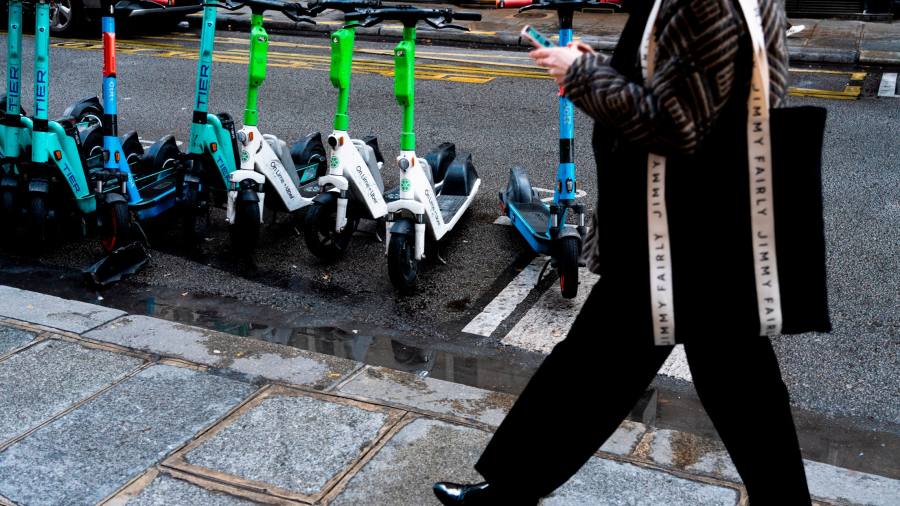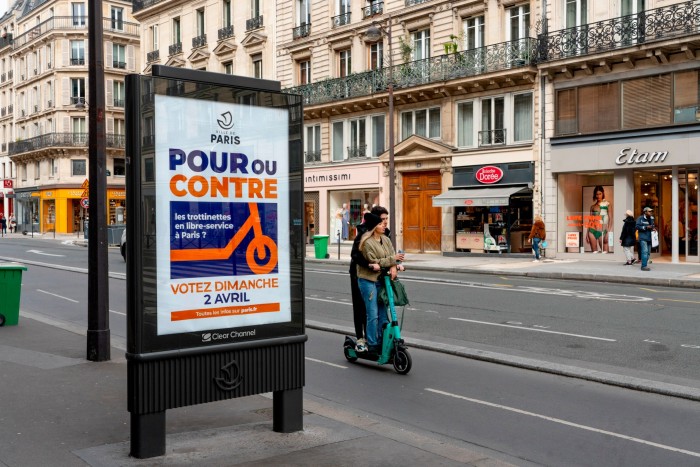
As hundreds of thousands of people protested over French pensions reforms in recent weeks, some Parisians found a novel use for the electric e-scooters that dot the streets: piling them high to build barricades.
But the ubiquitous stand-up “trottinettes” could soon vanish from the urban landscape. On April 2, in a first for Paris, the city hall is offering residents a referendum on whether to banish the controversial devices operated by rental companies, five years after they launched.
The vote will be the culmination of an angry debate over the 15,000 free-floating devices, which provided an alternative to strike-hit metro services in recent weeks, but have become a pet hate for some residents, while others argue they are a serious danger to pedestrians and traffic.
The scooters have focused some of the angst that has gripped the French capital in its rapid metamorphosis from a car-clogged metropolis to something more like experimentation zone for bikes, shared rides and every form of transportation in between.
“They fuel anxiety . . . there have been so many complaints from people telling us they can’t take it any more, that they go too fast, that riders’ behaviour is uncivil,” said David Belliard, deputy mayor of Paris in charge of transport and a green party member.
He is pushing for a ban despite the scooters’ billing as an environmentally friendly mode of transport. “We want to bring a sense of peace back to the public space,” he said.

The debate in Paris, the world’s most visited city, reflects some of the broader growing pains experienced globally in trying to plan for a greener future in urban centres, particularly since the Covid lockdowns of 2020.
As Paris’ streets emptied of cars during the acute phase of the pandemic, the city hall quickly constructed cycling thoroughfares that have attracted converts but irked drivers who complain of bottlenecks.
Shortages of bus and metro drivers since then have added to the shift towards bikes, scooters and even hoverboards as public transport services deteriorated — a setback that regional authorities say they are trying to tackle, especially as Paris prepares to host the Olympic Games in 2024.
This has resulted in a sometimes chaotic competition for street space, in which the e-scooters operated by rental companies, which run at up to 20 kilometres per hour and are often used by younger riders, have sparked anger.
“There are many more clashes with pedestrians. You don’t get that with bikes,” said Paris resident Arnaud Kielbasa, who created a victims’ association in 2019 after an electric scooter injured his now ex-wife when it crashed into her on a crossing.

Like many of the Parisians who want them gone, Kielbasa called out instances of e-scooter riders mounting pavements or riding in pairs, a banned practice.
Kielbasa had been inundated with hundreds of appeals from people seeking help in negotiating with insurers as they struggled to get their medical costs covered following accidents with e-scooters, he said.
For the three companies now operating e-scooters in Paris, however — Uber-owned Lime, Franco-Dutch Dott and Germany’s Tier — that bad press is unmerited, and unmatched in other cities they operate in, from Madrid to Tel Aviv.
Part of the problem, they acknowledged, stems from a free-for-all in 2018 before rules were tightened, when 11 operators were allowed to launch services without licenses, inundating Paris with 35,000 devices.
A lack of specific drop zones, which are now in place, meant the clunky devices were often abandoned in doorways. Many ended up at the bottom of the Seine river.
But the “trottinettes” — which some 400,000 people, or just under a quarter of Paris’ population, are registered to use — were involved in proportionally fewer accidents than rental bicycle services, according to a study carried out in 2020, and released this year, by consultancy 6t for Paris city hall.
Three people were killed last year on e-scooters in Paris. But these were privately owned devices, said Garance Lefèvre, senior director for public policy for France at Lime. Those are not targeted by the vote or potential ban, although at national level the transport ministry wants to tighten their usage to bar under-14s from riding them.
“There is a lot less anger from people who don’t like the scooters than there was in the beginning,” said Mahel Rahli, a manager for some of the Dott teams in Paris, who collect scooters to get them repaired or recharge their batteries.
One of 800 full-time employees at scooter operators in the city, he is now worried about his job because of the vote. “We don’t know if we’ll have a work contract or not,” Rahli said.
Operators have recently tightened their own practices further, barring those under 18 from registering for the devices. They argued that Paris authorities had not recognised their efforts to pursue a greener form of transport at a time when the city wants to start phasing out some older diesel cars.
For Belliard, however, the battle is also ideological, as he does not consider the sensor-clad, battery-operated devices to be an especially green option.
“Do we need to be supporting operators or devices which, every time they add more tech functions, are going to be consuming more bandwidth and more energy?” Belliard said.
He added that Paris’ indebted city hall was prepared to forgo the €900,000 a year it earns from the “trottinette” licences.
Whether Parisians will agree is still unclear. The vote will only take place in person, fuelling operators’ concerns that turnout may be very limited, while registration for the poll closed weeks ago. An Ifop opinion poll from mid-March found that 70 per cent of Parisians would vote against the “trottinettes”. One from September last year by Ipsos found the opposite, with two-thirds of residents keen to keep them.
Many e-scooter users in Paris were simply bemused, saying that if anything the “trottinettes” had proven their worth in recent weeks of transport strikes.
“It’s true there are accidents, you’ve got to be careful,” said 19-year-old history student Ademe Chiahou, on a break from classes in the city centre. “But there’ve not been many metros of late. I used a scooter just the other day when I couldn’t get around — it was great.”